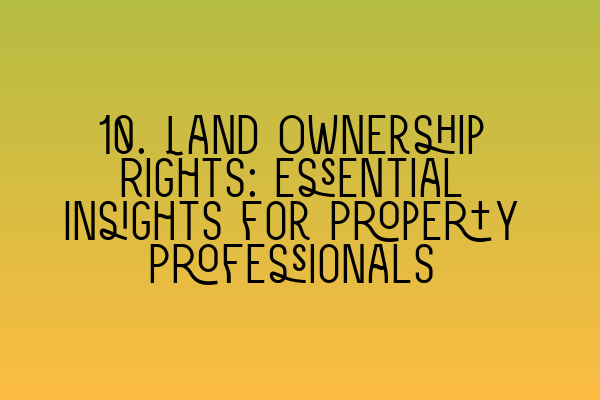Land Ownership Rights: Essential Insights for Property Professionals
As a property professional, understanding land ownership rights is essential for providing accurate and reliable advice to clients. Whether you are a conveyancer, solicitor, or land surveyor, having a strong grasp of these rights will enhance your expertise and enable you to navigate complex property transactions with confidence.
1. Freehold Ownership
Freehold ownership is the most absolute and unencumbered form of land ownership. When an individual or entity holds freehold ownership, they have complete control and possession over the land, including both the surface and any structures upon it. As a property professional, it is crucial to recognize the significance of freehold ownership in property transactions and to properly advise clients accordingly.
2. Leasehold Ownership
Leasehold ownership grants the right to occupy and use a property for a fixed period, typically ranging from 99 to 999 years. Unlike freehold ownership, leasehold ownership involves a contract or lease agreement between the landowner (freeholder) and the leaseholder. Property professionals must understand the intricacies of leasehold ownership, including ground rent payments, lease extensions, and enfranchisement rights, to effectively assist clients involved in leasehold properties.
3. Easements and Covenants
Easements and covenants are legal rights and restrictions that affect the use and enjoyment of land. Easements provide individuals with a non-possessory interest in another person’s land, such as a right of way or a right to access utilities. Covenants, on the other hand, are agreements that impose obligations on landowners, often for the benefit of neighboring properties. Understanding the implications of easements and covenants is essential when advising clients on property rights and obligations.
4. Restrictive Covenants
Restrictive covenants are specific types of covenants that limit or restrict the use of land. They are often found in residential areas to uphold certain standards, such as preventing the construction of certain types of buildings or restricting commercial activities. Property professionals must be aware of restrictive covenants in a given area to ensure compliance and avoid potential disputes for their clients.
5. Adverse Possession
Adverse possession is a legal doctrine that allows a person to claim ownership of a property if they have occupied it without permission for a certain period, typically 10 or 12 years. Property professionals should be familiar with adverse possession laws and understand the implications they may have on property disputes and ownership claims.
6. Co-ownership
Co-ownership refers to the joint ownership of a property by two or more individuals or entities. It can take various forms, such as joint tenancy or tenancy in common. Understanding the legal implications and rights of co-ownership is vital when advising clients involved in shared property ownership.
7. Land Registration
Land registration is the process of documenting and recording land ownership rights in an official register. In the UK, the Land Registry manages the land registration system. Property professionals should have a thorough understanding of land registration requirements and procedures to ensure the accurate transfer of property ownership and avoid potential complications.
8. Mortgages and Charges
Mortgages and charges are common forms of security for lenders when providing financing for property purchases. Property professionals must understand these legal instruments, including the rights and obligations they create for both borrowers and lenders. This knowledge is crucial for assisting clients in mortgage transactions and handling any potential issues that may arise.
9. Termination of Ownership Rights
Ownership rights can be terminated through various legal mechanisms, such as surrender, forfeiture, or compulsory purchase. Property professionals should be familiar with these termination methods and be able to guide clients through the legal processes involved.
10. Future Developments in Land Ownership
Land ownership rights are continually evolving, influenced by changes in legislation, societal norms, and technological advancements. Property professionals must stay informed about future developments in land ownership to provide up-to-date advice and solutions to clients. Ongoing professional development and remaining engaged with industry news and trends are essential for property professionals to stay at the forefront of their field.
As property professionals, understanding the nuances of land ownership rights is vital for effectively advising clients and navigating complex property transactions. By staying abreast of legal developments, maintaining a strong understanding of key concepts, and continuously expanding your knowledge, you can become a trusted and sought-after expert in property law.
If you’re looking to enhance your knowledge in property law and land law, consider exploring the SQE 1 Practice Exam Questions or the SQE 1 Practice Mocks FLK1 FLK2. Additionally, if you’re preparing for the SQE exams, check out our recommended SQE 2 Preparation Courses and SQE 1 Preparation Courses. Stay up to date with the SRA SQE Exam Dates and give yourself the best chance of success.
For more information on property law, feel free to reach out to SQE Property Law & Land Law at info@sqe-propertylaw.co.uk.
